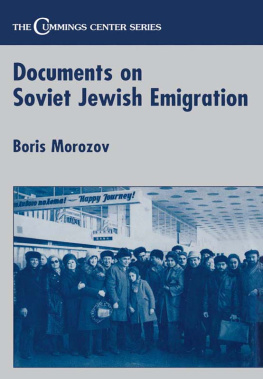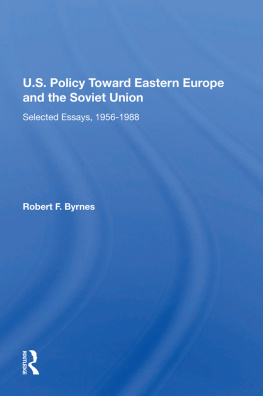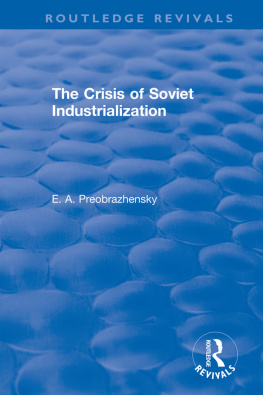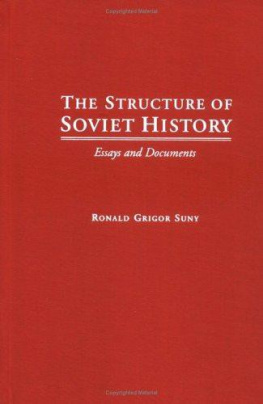
The International Library of Sociology
THE SOCIOLOGY OF THE SOVIET UNION
In 8 Volumes
| I | Chekhov and His Russia | Bruford |
| II | Educational Psychology in the USSR | Simon and Simon |
| III | Family in the USSR | Schlesinger |
| IV | History of a Soviet Collective Farm
(The above title is not available through Routledge in North America) | Belov |
| V | The Nationalities Problem and Soviet Administration | Schlesinger |
| VI | Psychology in the Soviet Union | Simon |
| VII | Soviet Legal Theory | Schlesinger |
| VIII | Soviet Youth | Meek |

First published in 1956 by
Routledge
Reprinted in 1998, 2002
by Routledge
2 Park Square, Milton Park, Abingdon, Oxon, OX14 4RN
Transferred to Digital Printing 2007
Routledge is an imprint of the Taylor & Francis Group
1956 Rudolf Schlesinger
1956 Translation, W. W. Gottlieb
All rights reserved. No part of this book may be reprinted or reproduced
or utilized in any form or by any electronic, mechanical, or other means,
now known or hereafter invented, including photocopying
and recording, or in any information storage or retrieval system, without
permission in writing from the publishers.
The publishers have made every effort to contact authors/copyright holders
of the works reprinted in The International Library of Sociology.
This has not been possible in every case, however, and we would
welcome correspondence from those individuals/companies
we have been unable to trace.
British Library Cataloguing in Publication Data
A CIP catalogue record for this book
is available from the British Library
The Nationalities Problem and Soviet Administration
ISBN 0-415-17813-4
The Sociology of the Soviet Union: 8 Volumes
ISBN 0-415-17836-3
The International Library of Sociology: 274 Volumes
ISBN 0-415-17838-X
ISBN 978-1-1362-8134-1 (ePub)
Publishers Note
The publisher has gone to great lengths to ensure the quality of this reprint
but points out that some imperfections in the original may be apparent
CONTENTS
PART I: THE FIRST STEPS IN THE ORGANIZATION
OF NATIONAL ADMINISTRATION
PART II: SOVIET NATIONALITIES POLICY UNDER THE
NEW ECONOMIC POLICY
PART III: THE CRISIS IN THE VILLAGE AND THE STRUGGLE
FOR THE COLLECTIVIZATION OF AGRICULTURE
INTRODUCTION
The application of Soviet nationalities policies in the administration of the non-Russian areas may invite the readers interest for a number of reasons. The subject is one of fairly broad interest in itself; it is directly relevant to important aspects of current history and politics in other parts of the world. While a good deal of fairly frank Soviet documentary evidence is available for the first fifteen years after the Revolution, this evidence is not widely accessible. So far as it has been used in Western publications, such use has been inevitably coloured by the authors standpoint and interests, so that the presentation of a selection of representative original evidence may be helpful to the student who wishes critically to use those publications, and also to the historian or political scientist who works on related subjects without having access to the original Russian documents.
In order to give a selection aiming at a fairly representative illustration (though not at completeness) in a volume of limited length, emphasis on certain stages in the development of Soviet nationalities policies was desirable. Most of the documents from the first period of the Soviet regime deal with the constitutional aspects of nationalities policies; a translation of the most important of these documents is available in W. R. Batsells Soviet Rule in Russia (London, 1929).A presentation of the history of the first five years of Soviet nationalities policies is given in Part III (Dispersal and Reunion) of Volume I of E. H. Carrs The Bolshevik Revolution: 1917-1923, which is likely to remain for many years the standard work on the subject. Anyone who would wish to improve upon it would in any case have to go back to the original sources. In these circumstances, we believed that the treatment of those first five years in the present volume could be reduced to a skeleton of a few documents which may be helpful for the understanding of the developments of the following ten years.
For the opposite reason, the last (fifth) section of our collection was also reduced to a skeleton. While the origins of Soviet national administration are fairly discussed in existing Soviet literature, with starts precisely after having seen on what type of Soviet evidence such study is based. It is not the task of a documentation volume to replace interpretation: I felt it necessary, however, to state at the very opening of this volume the limits within which, for different reasons, comprehensiveness at least of illustration has been aimed at for the different periods treated in this book.
It is obviously impossible to eliminate ideological statements in a collection of Soviet documents. By emphasizing the administrative aspects of Soviet nationalities policies I hoped to keep them within certain limits, and to shift the balance towards the practical issues of the daily life of the non-Russian nationalities. Some sidelights on local government in the USSR in general should not be regarded as more than a by-product of our main effort. A collection of the authoritative policy statements is available in Stalins Marxism and the National and Colonial Question. Document 3 of our collection has been chosen from the standpoint of including in this volume such statements of the main architect of Soviet nationalities policy of which only small parts were before available in English, and also of supplying a general survey of the situation of the opening of NEP from a highly practical point of view.
The aim of the nationalities policy of the Russian Bolsheviks, and also of that of the Austrian Social Democrats in polemic against whom many of their arguments originated, was to secure to the working class a leading position in the transformation of a multinational state. Much confusion about its content has originated from the very different meaning of nationality in Western and Eastern Europe. Only in the Western tradition is nationality associated with belonging to a certain national state, in the formation process of which the nation was shaped. In this framework, for example, the recognition of the obvious fact that the Czechs have a history and civilization of their own, different from that of the Austro-Germans, nearly begged the question how to satisfy their legitimate ambitions, and the argument can be extended to far less developed nations. In the eastern half of Europe and the adjacent parts of Asia, however, multi-national states originated in the fifteenth and sixteenth centuries (i.e. slightly after the consolidation of the French and English monarchies in the West). This happened first under the impact of the Tatar invasion upon the Russians and Turks, and after in the struggle of the multi-national empires with each other. Of the four which existed in Europe, the Polish was divided up long before, and the Turkish shortly before, the Austrian and Russian socialists had their opportunity to discuss how the problem could be tackled in the two surviving units (which were enlarged by annexations of parts of the territory of their unlucky competitors).










